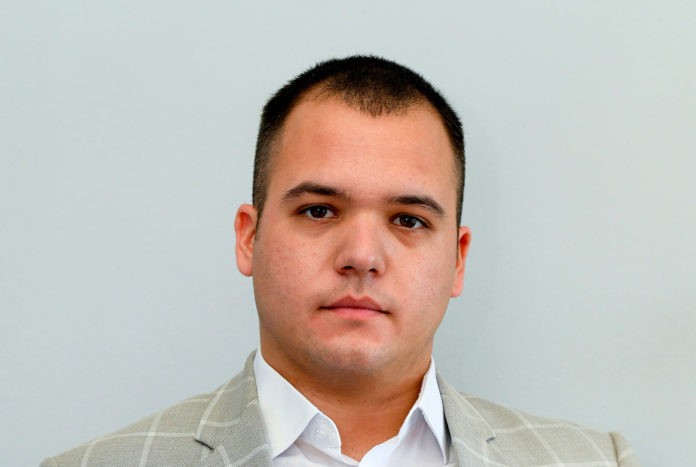In an awakening market with more and more company start-ups, Serbia’s tissue industry is “in a constant state of growth.” Here, Lazar Stevanović, commercial director of Čačak-based manufacturer Camelia, looks to the future.
TWM/1: Tell us about your company …
“Camelia was founded in 2006 from humble beginning – with just four workers, we bought a machine and faced something that was completely new to us all at the moment.
“As time passed, a second machine arrived, followed by a third shortly after. This way we were soon able to offer our customers a plethora of products – paper, tissues, toilet paper, kitchen towels, and serviettes – the same products we produce today, but on much more modern machines.
“We expect a new machine to arrive by the end of the year, the likes of which have not yet been seen in Serbia. I believe that will increase our quality by a significant margin and substantially increase our capacity. That is all I can say for now.”
TWM/2: Is there growth in the tissue market in Serbia and do you expect it to continue?
“The industry we are in is in a constant state of growth, which means that more and more companies are appearing. The figures of the leading companies in the industry are garnering a noticeable growth. Of course, there are instances in which smaller companies cease operations, but overall, the number of such cases is negligible.
“I believe this industry has a bright future ahead of it, but, of course, that remains to be seen in the coming years. The biggest share of the market belongs to large trade systems. There is a huge number of markets, usually at good locations, and they take first place. Apart from that, almost every town in Serbia has a local market chain that should not be dismissed in any way. An interesting fact is that many traditional marketplaces survive in Serbia as well.
“Marketplaces still function as a place where you can find whatever you may need at a given time, and many citizens still visit such places whether it be as a force of habit or just the trust they have in the sellers located there. With that in mind, marketplaces should not be dismissed either, no matter which industry you are in.”
TWM/3: Is there much private label in Serbia?
“Private labels in Serbia take up much of the market. If you are serious in any way, you must always be focused on the private label. There are certain companies that are focused solely on producing private labels and I can say their profit margins are impressive.
“As I have mentioned before, a large part of the market belongs to numerous systems, and all of them have their own private label. Recently, smaller chains began acting similarly, so we are now in a situation where almost every market has its own private label. In any case, private labels are very present in Serbia, but I expect a surge in the following years.”
TWM/4: How is the consumer market doing?
“The situation in Serbia has improved in the past several years. I believe – and often say – that consumers are much smarter nowadays. Cellulose products rank number one, definitely. A noticeable trend in Serbia is that consumers are often buying quality paper in larger packaging, which was not the case just a few years ago.
“Consumers easily spot quality and care very much about what they receive for the money they give. You can fool a customer once, but that is where the story ends, and you end up painting a bad picture for your brand. Every town is a story for itself.
“There is not a single template that can be applied everywhere. What is common everywhere is that quality prevails and consumers easily recognise it.”
TWM/5: What trends are you seeing in the surrounding countries in terms of tissue?
“We are present both on the domestic market and in the countries of the region. Adding to that, Serbia is a very interesting market for all the key players in the region. I see that as a positive foundation, because healthy competition is something that entices you to improve yourself.
“A less positive situation is the one in which smaller companies are trying to win market share by undercutting prices by a huge margin. They can cause a brief disruption of the domestic companies, but soon they come to a realisation that it is impossible to operate without healthy profit margins.
“We have an excellent cooperation with all the countries in the region. There is a huge potential for improvement, but we are satisfied where we are now.”
TWM/6: How is Covid-19 impacting the region?
“The Covid-19 situation in Serbia is still far from perfect. We have had a surge of infections during the past two weeks, prompting the Serbian Government to reimpose some of the restrictive measures. I believe we have let down our guard too soon, blinded by the brief good results we achieved and soon acted as if nothing is happening at all.
“Citizens are avoiding huge crowds, so they are shopping only much more often. Many people were laid off as well, so purchasing power took a hit as well. At this moment, no single person can reliably predict how long this situation will last. We are already feeling some consequences and undoubtedly more will follow.”
TWM/7: How is Covid-19 impacting your company, what key opportunities and challenges come with it?
“I am of the opinion that nothing positive arose from the outbreak of the novel coronavirus. Some people would say that the sales of toilet paper have jumped, which was true, but only during the first few weeks of the outbreak, followed by a downturn in sales, because all the purchased product had to be expended first.
“On the other side, there are people who are in constant fear both for themselves and their families. As far as our company is concerned, we had no major issues so far.
“All workers have been issued safety masks and we have imposed mandatory disinfection. It is, of course, impossible to keep track of their activities outside of work, but we try to respect the safety guidelines as much as possible during work hours. So far that has yielded good results.”
TWM/8: What are your plans for the next few years?
“We are finalising the building of a large building that will significantly ease our workflow. At the moment our capacities are filled, and that is the biggest issue we currently face from a business standpoint. We expect that to change by the end of the year. If you plan on competing and improving yourself, constant investments are needed.
“With that in mind we are already planning to build new facilities at the start of the next year. Infrastructure is something that requires constant improvement. A space you find adequate today suddenly becomes way too small tomorrow.
“By opening a distribution center in Belgrade, we have gained significant advantages in terms of logistics, and cut our delivery times to an absolute minimum. Adaptability is a key trait in this business. We constantly listen to the needs of our consumers and the latest trends in the market, which is in a way a key to our success.”

































